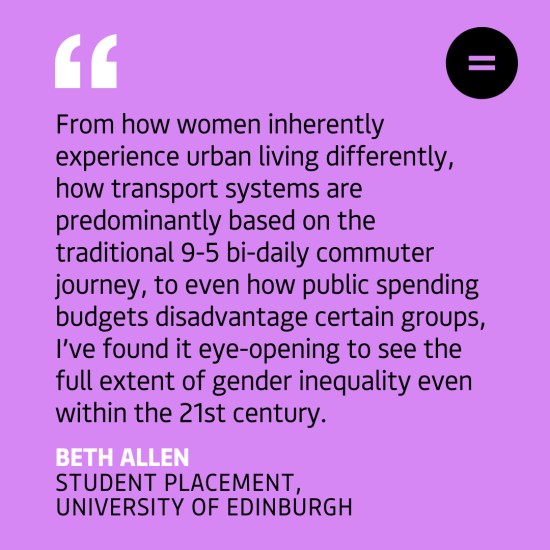Engender blog
GUEST POST: Reflections of the Student Placement Experience - An Insight into the Women’s Sector in Scotland
Today we're publishing the next in a series of blogs from recent student placements Engender has hosted from the MSc in Social Research at the University of Edinburgh and the University of Strathclyde Applied Gender Studies and Research Methods course.
In this post, Beth reflects on her experience of undertaking a research placement and the importance of considering urban planning policies through a feminist lens.

During the summer semester of my MSc in Social Research at the University of Edinburgh, I have been fortunate enough to experience completing my dissertation as a placement student with Engender. This placement has been invaluable, and I wanted to take this opportunity to reflect on this and maybe inspire others to gain experience of working within the women’s sector.
Firstly, admittedly somewhat naïvely, despite having a keen interest in the issue of gender equality, stemming from my undergraduate psychology dissertation looking at how perceptions of how social change occurs impacts the likelihood of participating in collective action to fight for gender equality, I had little knowledge of the extent to the work of the women’s sector. Through the process of gaining my placement with Engender, I began to explore this area of the third sector in more depth and realised how, particularly in Scotland, there is a network of amazing organisations and campaigns working towards promoting gender equality. From specifics of the economic work of the Scottish Women’s Budget Group and Close the Gap, the fight for equal representation in politics via the Women 50:50 campaign or Zero Tolerance working to eradicate VAWG, to organisations such as the Young Women’s Movement and, of course, Engender, who work on a range of cross-sectional issues surrounding gender equality. I find it fascinating that within a devolved nation with a relatively small population, so much incredibly important work is being done by dedicated and passionate individuals. The work of my placement, looking at the implementation of feminist urban planning policies in Scotland, is just one example where I’ve discovered how gender inequalities manifest in so many more ways than perhaps the most notably recognisable, such as the gender pay gap. From how women inherently experience urban living differently, how transport systems are predominantly based on the traditional 9-5 bi-daily commuter journey, neglecting the complex, multi-dimensional journeys carried out by those with caring responsibilities (inherently more likely to be women), to even how public spending budgets disadvantage certain groups, I’ve found it eye-opening to see the full extent of gender inequality even within the 21st century.
Returning to my experience working in collaboration with Engender as a placement student, it’s an opportunity I am extremely appreciative to have been given. I believe it has helped me produce a higher quality research project to use as my dissertation through the networks Engender has with experts within the policy field and available resources. Additionally, it has provided me with extra motivation to take on such a daunting independent project by knowing that, hopefully, my output will be of use for Engender to take this issue forward into their work. It’s been a great experience to understand the essential work the team at Engender does, and has provided me with a multitude of opportunities I wouldn’t have been aware of had I not completed this placement. For example, in June, I attended the event Feminist Urbanism: What is it and why now? hosted by Jude Barber and Daisy Narayanan and supported by the Royal Society of Edinburgh as part of the Architecture Fringe for 2023. This took the form of a round table discussion with Councillor Holly Bruce, who passed the motion to embed feminist planning principles into Glasgow City Council, and Professor Suzanne Ewing, who worked on the Women Make Cities Initiative. This was followed by an open floor discussion of attendees, ranging from councillors, architects, urban designers, civil servants, and other interested students like me. I found this event a really positive experience, and as my first feminist event, it was truly empowering to be in a room with many other individuals from all backgrounds, professions, and ages, all passionate about changing the same thing.
Based on my experiences, my biggest recommendation to other budding feminist researchers or those wanting to enter the women’s sector is to go to these events (sign up for Engender’s Friday Feminist Five newsletter which is a great resource to find out about these!) Embrace the supportive community evident within feminist work, especially in Scotland and explore areas you wouldn’t have thought of considering before. And, of course, if the opportunity of placement with Engender arises, grab it with both hands you will not regret it!
Engender occasionally works with students as part of their placement requirements for university or college courses - this allows students to work with Engender on specific areas of our work for women's equality. Student blogs form part of their course assessment, and they do not receive payment from Engender.
Share this post on …
Comments: 0 (Add)
Sign up to our mailing list
Receive key feminist updates direct to your inbox:
